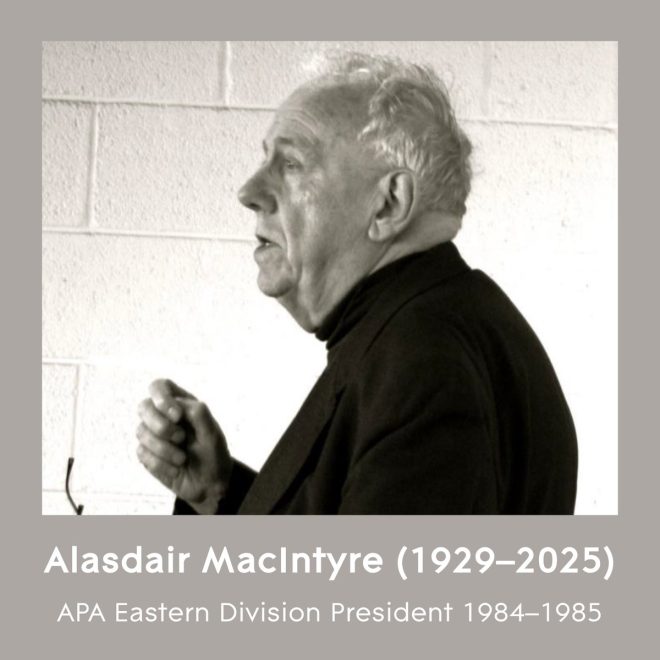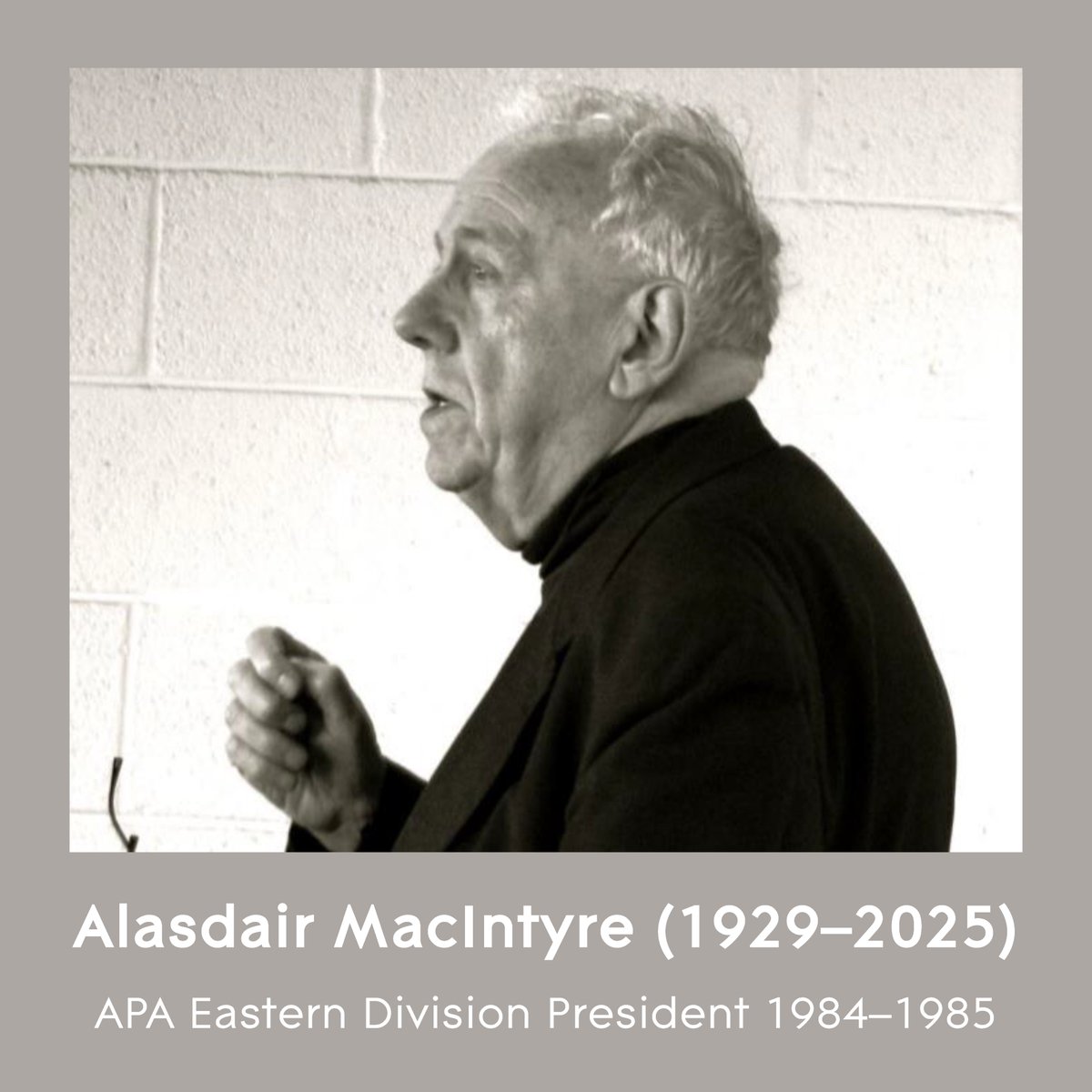
Death- Obituary news
Remembering Professor Alasdair Chalmers MacIntyre: A Legacy in Philosophy
On May 22, 2025, the American Philosophical Association (APA) announced with deep sorrow the passing of Professor Alasdair Chalmers MacIntyre, a prominent figure in the field of philosophy, who significantly shaped contemporary moral philosophy and political thought. Born in 1929, MacIntyre’s academic journey was marked by his unwavering commitment to exploring the complexities of ethical theory, the nature of human action, and the role of tradition in moral discourse. His contributions have left an indelible mark on philosophy, making him a revered figure among scholars and students alike.
A Distinguished Academic Career
Professor MacIntyre served as the Rev. John A. O’Brien Senior Research Professor Emeritus of Philosophy at the University of Notre Dame, a position that underscored his intellectual prowess and dedication to teaching. His tenure at Notre Dame was characterized by a commitment to fostering critical thinking and encouraging students to engage deeply with philosophical questions. Throughout his career, he held numerous prestigious positions, including the presidency of the American Philosophical Association’s Eastern Division from 1984 to 1985. This leadership role further exemplifies his influence and standing within the philosophical community.
Key Contributions to Philosophy
MacIntyre is perhaps best known for his seminal work, "After Virtue," published in 1981, which has become a touchstone in contemporary ethical theory. In this work, he critiques modern moral philosophy, arguing that it has become disjointed and disconnected from the historical traditions that give it meaning. He advocates for a return to Aristotelian ethics, emphasizing the importance of virtue, community, and the narrative context of human life. This book has sparked widespread discussions and debates, influencing a generation of philosophers and ethicists.
- YOU MAY ALSO LIKE TO WATCH THIS TRENDING STORY ON YOUTUBE. Waverly Hills Hospital's Horror Story: The Most Haunted Room 502
His exploration of virtue ethics is a significant aspect of his work, emphasizing the importance of character and the cultivation of virtues as essential for a good life. MacIntyre argues that moral philosophy must be rooted in the traditions and practices of communities, challenging the individualistic approaches that dominate contemporary ethical discussions. His insistence on the interconnectedness of ethics and social practices has reshaped how philosophers think about morality.
The Influence of Tradition in Ethics
Another major theme in MacIntyre’s work is the role of tradition in shaping moral understanding. He posits that ethical frameworks are not just abstract principles but are deeply embedded in the historical contexts and practices of communities. This perspective invites a reevaluation of how moral reasoning is conducted, encouraging a dialogue between contemporary ethical theories and the rich tapestry of philosophical traditions that have come before.
MacIntyre’s emphasis on the importance of narrative and the historical context of moral claims challenges the reduction of ethics to mere rules or principles. Instead, he encourages a view of ethics that is dynamic and responsive to the complexities of human life. His ideas have inspired scholars across various disciplines, including political theory, theology, and sociology, highlighting the interdisciplinary impact of his thought.
A Lasting Legacy
The legacy of Professor Alasdair MacIntyre extends beyond his written works; it is also found in the countless students and scholars he inspired throughout his career. His dedication to teaching and mentoring fostered an environment where philosophical inquiry thrived. Many of his students have gone on to become influential philosophers in their own right, carrying forward his ideas and methodologies into new areas of research.
In addition to his academic contributions, MacIntyre’s public engagement and participation in philosophical discourse have enriched the broader intellectual landscape. His ability to articulate complex ideas in accessible ways has made philosophy more approachable, encouraging a wider audience to engage with profound questions about morality and society.
Remembering a Philosopher
As the philosophical community reflects on the life and work of Alasdair Chalmers MacIntyre, it is essential to recognize his profound influence on the field. His critiques of modernity, advocacy for virtue ethics, and emphasis on the importance of tradition have reshaped contemporary philosophical discourse. The APA’s acknowledgment of his passing is a testament to the respect and admiration he garnered throughout his life, marking the loss of a giant in philosophy.
In conclusion, Professor MacIntyre’s contributions to philosophy will continue to resonate for years to come. His insights into the nature of ethics, the role of community, and the significance of tradition offer invaluable guidance in navigating the moral complexities of the modern world. As we remember his life and work, we celebrate the enduring impact he has had on the field of philosophy and the many lives he touched as a teacher, mentor, and thinker.
The academic community will undoubtedly carry forward the torch of inquiry that MacIntyre so passionately upheld, ensuring that his legacy remains a guiding light in the pursuit of understanding human morality and the philosophical underpinnings of our social practices. His commitment to exploring the intersection of ethics and community life continues to inspire new generations of philosophers, making his ideas as relevant today as they were during his illustrious career.
As we commemorate the life of Alasdair Chalmers MacIntyre, let us honor his contributions by engaging with the questions he so ardently explored, fostering a dialogue that respects the richness of philosophical tradition while addressing the pressing ethical challenges of our time. His legacy serves as a reminder of the importance of philosophy in our lives, encouraging us to think critically, act virtuously, and engage meaningfully with one another.

The APA is saddened to note the passing of Professor Alasdair Chalmers MacIntyre (1929–2025). MacIntyre was 1984–1985 @APAEastern president. He was Rev. John A. O’Brien Senior Research Professor Emeritus of Philosophy at the University of Notre Dame.
Photo: Sean O’Connor (CC-BY) pic.twitter.com/cp53RVJStm
— American Philosophical Association (@apaphilosophy) May 22, 2025
The APA is saddened to note the passing of Professor Alasdair Chalmers MacIntyre (1929–2025)
The philosophical community is grieving the loss of a monumental figure, Professor Alasdair Chalmers MacIntyre, who passed away in 2025. His contributions to philosophy have left an indelible mark, influencing generations of scholars and students alike. MacIntyre was known for his rigorous analyses and compelling arguments, particularly in ethics and political philosophy. He held the esteemed position of Rev. John A. O’Brien Senior Research Professor Emeritus of Philosophy at the University of Notre Dame. His legacy is one that will resonate for years to come, and his work will continue to inspire critical thought and debate.
MacIntyre’s Role as APA Eastern President
Between 1984 and 1985, MacIntyre served as the president of the American Philosophical Association (APA) Eastern Division. This role was not just a title; it was an opportunity for him to shape discussions and promote philosophical inquiry during a pivotal time. Under his leadership, the APA focused on fostering an inclusive environment for philosophical discourse, encouraging diverse perspectives that ultimately enriched the field. His presidency was a testament to his commitment to philosophy and his peers, as he sought to elevate the standards of academic excellence.
Academic Contributions and Philosophical Impact
MacIntyre’s philosophical journey is marked by his influential works, such as “After Virtue,” published in 1981. This book argues that modern moral philosophy must return to the Aristotelian tradition to regain its footing in a world that often seems morally fragmented. His examination of virtue ethics has sparked discussions that continue to this day, making him a key figure in contemporary ethical debates. In a world increasingly characterized by relativism, MacIntyre’s insistence on the importance of tradition and community in understanding morality is both timely and essential.
Another significant aspect of MacIntyre’s work is his critique of Enlightenment moral philosophy. He posited that the Enlightenment’s focus on individualism and rationality led to a disconnection from communal values and traditions. His arguments challenge us to reconsider how we approach ethics and the social fabric that supports our moral beliefs. This perspective has not only influenced philosophers but also social scientists and political theorists who seek to understand the complexities of human behavior.
Teaching Philosophy and Mentorship
As a professor, MacIntyre was known for his engaging teaching style and his ability to inspire students. His classes were not merely lectures; they were dialogues that encouraged critical thinking and inquiry. Many of his students have gone on to make their own contributions to philosophy, carrying forward the ideals and insights they gained under his mentorship. MacIntyre believed in the importance of nurturing the next generation of thinkers, and his dedication to teaching was evident in his interactions with students.
Moreover, his role at the University of Notre Dame enabled him to shape the philosophy department, bringing in diverse voices and fostering an environment that valued both rigorous scholarship and intellectual exploration. His impact as a teacher and mentor will be felt long after his passing, as his students continue to engage with and expand upon his ideas.
Legacy and Remembrance
In the wake of his passing, many are reflecting on MacIntyre’s profound influence on the field of philosophy. His writings will undoubtedly continue to be studied and debated, as they provide a framework for addressing some of the most pressing ethical questions of our time. The APA’s acknowledgment of his contributions highlights the significance of his work and the void his absence leaves in the philosophical community.
MacIntyre’s legacy extends beyond his academic achievements; it includes his unwavering commitment to the pursuit of truth and understanding. He challenged us to think deeply about our moral beliefs and the societal structures that shape them. His life’s work serves as a reminder of the importance of philosophy in navigating the complexities of human existence.
The Power of Community in Philosophy
One of the core themes in MacIntyre’s philosophy is the importance of community in shaping our understanding of ethics. He argued that moral beliefs cannot exist in a vacuum; they are deeply intertwined with the traditions and practices of the communities we inhabit. This perspective resonates today as we grapple with issues of social justice, identity, and belonging.
MacIntyre’s emphasis on communal values encourages us to engage with one another, fostering dialogue that transcends individual perspectives. In a world that often promotes division, his work serves as a powerful reminder of the necessity of bringing diverse voices together to create a more coherent understanding of ethics and morality.
In Celebration of a Great Mind
As we reflect on the life and contributions of Alasdair Chalmers MacIntyre, it’s essential to celebrate the richness he brought to philosophy. His ability to weave complex ideas into accessible arguments made philosophy more approachable and relevant to everyday life. For many, his works have been a source of inspiration, a call to engage with life’s fundamental questions.
The philosophical community will continue to honor his memory by engaging with his ideas, challenging ourselves to think critically about the moral landscapes we navigate. His legacy is not just in the texts he produced, but in the spirit of inquiry and debate that he fostered throughout his life.
Remembering MacIntyre: A Call to Action for Philosophers
In light of MacIntyre’s passing, it is a fitting moment for philosophers and scholars to reflect on their own roles in the community. Are we fostering the kind of dialogue that MacIntyre valued? Are we encouraging the next generation to think critically about ethics and morality?
Let his legacy inspire us to engage more deeply with the world around us, to question our assumptions, and to seek understanding across differences. Whether we are seasoned philosophers or newcomers to the field, we all have a part to play in continuing the conversations that MacIntyre so passionately championed.
As we remember Professor Alasdair Chalmers MacIntyre, let us also commit ourselves to the ongoing pursuit of philosophical inquiry, ensuring that his impact lives on in our discussions, our teachings, and our lives.
